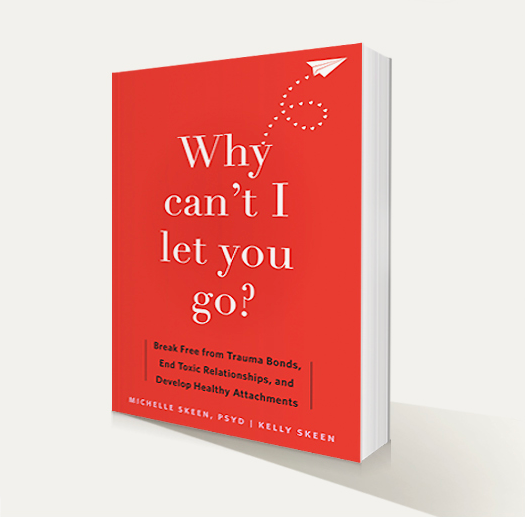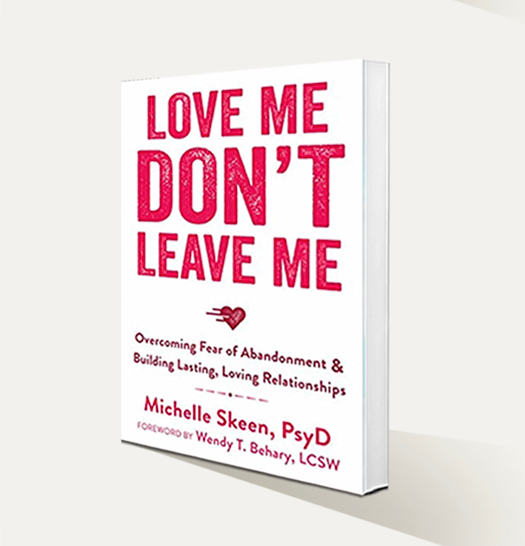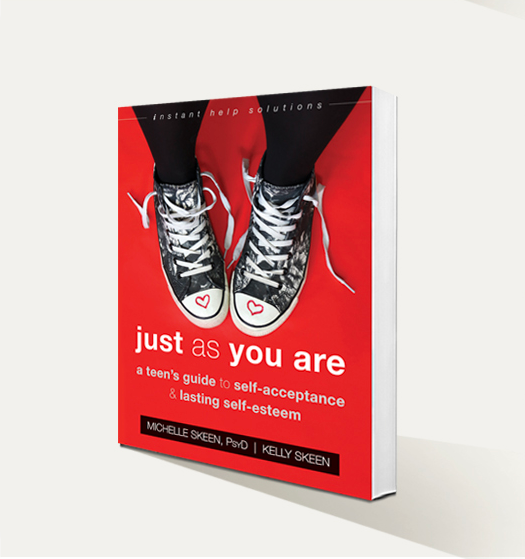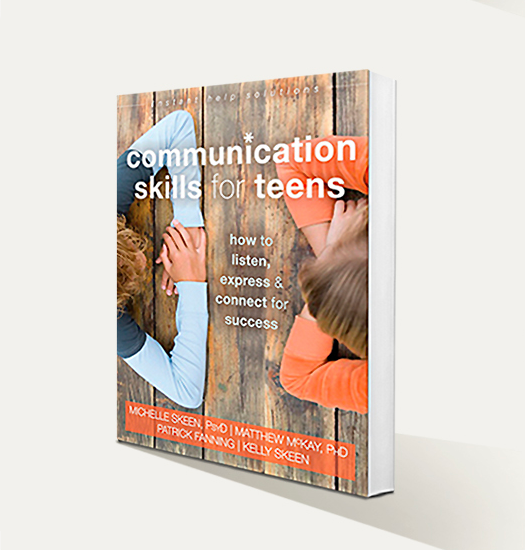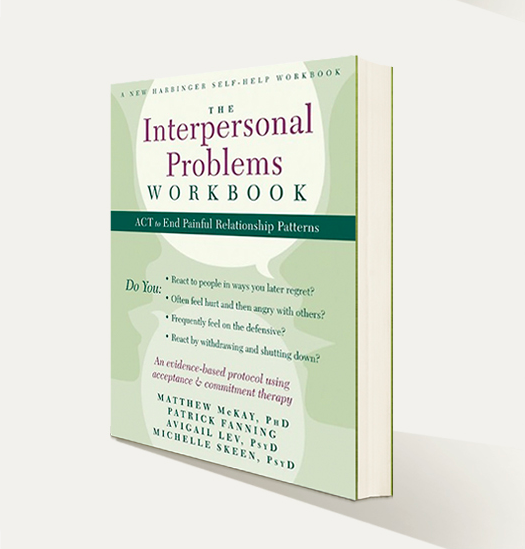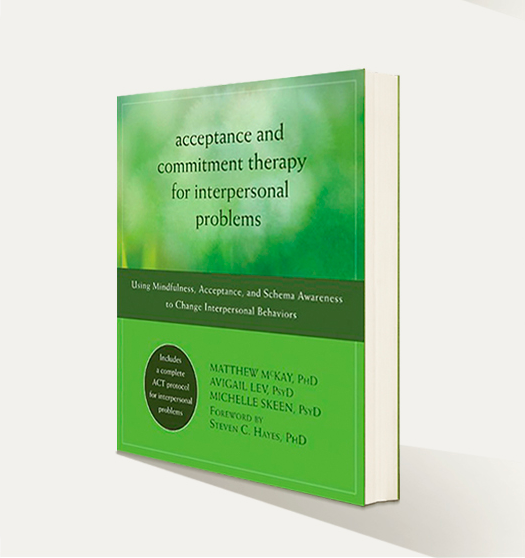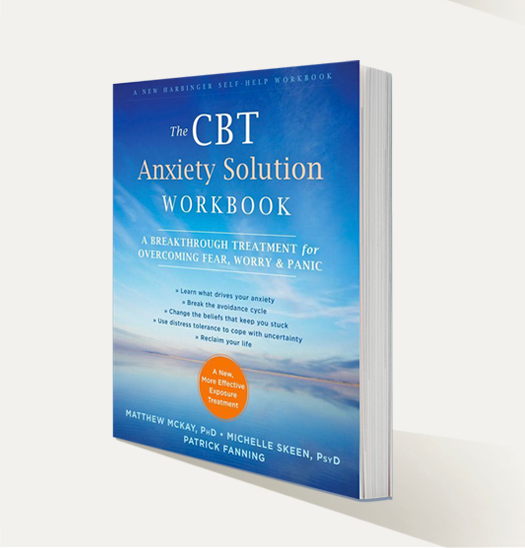Radio show on Thursday November 1, 2018
This week on Relationships 2.0 my guest host is Shawn T. Smith PsyD who interviewed me about my book Love Me Don’t Leave Me: Overcoming the Fear of Abandonment & Building Lasting, Loving Relationships
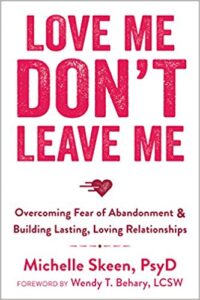 About the book: Everyone thrives on love, comfort, and the safety of family, friends, and community. But if you are denied these basic comforts early in life, whether through a lack of physical affection or emotional bonding, you may develop intense fears of abandonment that can last well into adulthood―fears so powerful that they can actually cause you to push people away. If you suffer from fears of abandonment, you may have underlying feelings of anger, shame, fear, anxiety, depression, and grief. These emotions are intense and painful, and when they surface they can lead to a number of negative behaviors, such as jealousy, clinging, and emotional blackmail. In Love Me, Don’t Leave Me, therapist Michelle Skeen combines acceptance and commitment therapy (ACT), schema therapy, and dialectical behavioral therapy (DBT) to help you identify the root of your fears. In this book you’ll learn how schema coping behaviors―deeply entrenched and automatic behaviors rooted in childhood experiences and fears―can take over and cause you to inadvertently sabotage your relationships. By recognizing these coping behaviors and understanding their cause, you will not only gain powerful insights into your own mind, but also into the minds of those around you. If you are ready to break the self-fulfilling cycle of mistrust, clinginess, and heartbreak and start building lasting, trusting relationships, this book will be your guide.
About the book: Everyone thrives on love, comfort, and the safety of family, friends, and community. But if you are denied these basic comforts early in life, whether through a lack of physical affection or emotional bonding, you may develop intense fears of abandonment that can last well into adulthood―fears so powerful that they can actually cause you to push people away. If you suffer from fears of abandonment, you may have underlying feelings of anger, shame, fear, anxiety, depression, and grief. These emotions are intense and painful, and when they surface they can lead to a number of negative behaviors, such as jealousy, clinging, and emotional blackmail. In Love Me, Don’t Leave Me, therapist Michelle Skeen combines acceptance and commitment therapy (ACT), schema therapy, and dialectical behavioral therapy (DBT) to help you identify the root of your fears. In this book you’ll learn how schema coping behaviors―deeply entrenched and automatic behaviors rooted in childhood experiences and fears―can take over and cause you to inadvertently sabotage your relationships. By recognizing these coping behaviors and understanding their cause, you will not only gain powerful insights into your own mind, but also into the minds of those around you. If you are ready to break the self-fulfilling cycle of mistrust, clinginess, and heartbreak and start building lasting, trusting relationships, this book will be your guide.
About the author: Michelle Skeen, PsyD, has a doctorate in clinical psychology. She is author of seven books, all designed to enhance relationships by emphasizing the importance of identifying core values and valued intentions, limited thinking, mindfulness, self-compassion, empathy, and effective communication and conflict resolution skills. Her passion is coaching individuals in creating and maintaining healthy relationships by bringing awareness to obstacles (fears and beliefs), which often work unconsciously to limit connections with others. Michelle believes that an early introduction and education in core values and healthy communication are essential life skills for success. To that end, Michelle and her daughter, Kelly, coauthored Communication Skills for Teens and Just As You Are. Skeen completed her postdoctoral work at the University of California, San Francisco. She codeveloped an empirically validated protocol for the treatment of interpersonal problems that resulted in two books: Acceptance and Commitment Therapy for Interpersonal Problems and The Interpersonal Problems Workbook. Michelle’s work has appeared in more than thirty publications around the world. She hosts a weekly radio show called Relationships 2.0 with Dr. Michelle Skeen that airs nationally. To find out more, visit her website at www.michelleskeen.com.
My radio show on Thursday January 25, 2018
This week on Relationships 2.0 my guest is Daniel S. Lobel, PhD author of When Your Daughter Has BPD: Essential Skills to Help Families Manage Borderline Personality Disorder
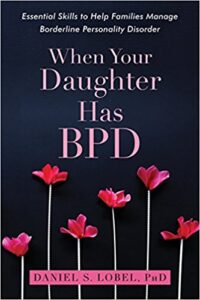 About the book:
About the book:
In this groundbreaking book, psychologist Daniel Lobel offers essential skills based in dialectical behavior therapy (DBT) and cognitive behavioral therapy (CBT) to help you understand your daughter’s disorder, define appropriate boundaries, put an end to daily emergencies, and rebuild the family’s structure from the ground up.
If you have a daughter with borderline personality disorder (BPD), you may feel frustration, shame, and your family may be at the breaking point dealing with angry outbursts, threats, and constant emergencies. You may even feel guilty for not enjoying spending time with your child—but how can you when her behavior is abusive toward you and the rest of your family? You need solid skills you can use now to help your daughter and hold your family together.
In this important guide, you’ll learn real solutions and strategies based in proven-effective DBT and CBT to help you weather the storm of BPD and restore a sense of normalcy and balance in your life. You’ll find an overview of BPD so you can better understand the driving forces behind your daughter’s difficult behavior. You’ll discover how you can help your daughter get the help she needs while also setting boundaries that foster respect and self-care for you and others in your family. And, most importantly, you’ll learn “emergency parenting techniques” to help you put a stop to abusive patterns and restore peace.
If your daughter has BPD and your family is struggling to make it through each day, this book offers essential skills to help you cope and recover a sense of stability.
About the author:
Daniel S. Lobel, PhD, is assistant clinical professor of psychiatry at the Icahn School of Medicine at Mount Sinai, and has given classes at both State University of New York (SUNY) at Purchase and the State University of New York College of Optometry. He has written chapters in many textbooks and contributes frequently as a guest blogger on the Psychology Today website. Lobel is a psychologist with a private practice. He resides in Katonah, NY.
My radio show on Thursday September 21, 2017
This week on Relationships 2.0 my guest is Rebekah Freedom McClaskey author of Breakup Rehab: Creating the Love You Want
 About the book:
About the book:
Turn Your Pain from Breakup into an Opportunity to Grow toward True Love
After her devastating breakup, counselor Rebekah Freedom McClaskey became inspired by her work in the field of addiction recovery to craft a safe, step-by-step path to forging healthy relationships based on honesty, love, integrity, and trust. Breakup Rehab addresses post-breakup chaos, providing clarity and direction so that your next relationship will be your best relationship.
This wise, real-world, and often humorous guide acknowledges the state of grief or resignation that comes with a breakup and then walks you through the stages of forgiveness and letting go. Along the way, you’ll experience a more compassionate self-awareness as you rebuild self-confidence and learn how to be loved for who you truly are. These steps will propel you forward on your unique path, as you recognize your life’s purpose and then travel toward well-being and a love that will set you free.
About the author:
Rebekah Freedom McClaskey is a breakup specialist whose private practice focuses on helping clients get what they want out of life and love. She lives in Southern California.
My radio show on Thursday September 1, 2016
This week on Relationships 2.0 my guest is Candace V. Love author of No More Narcissists!: How to Stop Choosing Self-Absorbed Men and Find the Love You Deserve

About the book:
Why do some women date, or even marry, narcissistic men—over and over? In this provocative book, a clinical psychologist and expert in narcissism offers 7 secrets to help women finally break free from their attraction to narcissistic men.
Do you keep finding yourself in relationships with narcissistic men? Is your boyfriend or husband solely focused on fulfilling their own needs and unable to see things from your perspective? If you’re tired of dealing with a self-absorbed partner and are ready to be treated with kindness, respect, and sensitivity, this book is for you.
In No More Narcissists!, psychologist Candace Love provides a road map for women to finally get the love they deserve. Using skills based in cognitive behavioral and schema therapy, you’ll gain an understanding of why you’re attracted to narcissistic men, how you can avoid being drawn in by a narcissist’s initial charm and magnetism, and how to heal so you can finally move on to healthy relationships.
You’ll find out how the basic principles of schema theory—core beliefs about ourselves and our environment that we acquire in childhood and adolescence—can play an important role in why you’re attracted to narcissists and seek them out. Also included are targeted exercises and techniques that will encourage you to examine your past relationships and take meaningful steps to promote self-care and healing.
Isn’t it time you broke the cycle of hurt, frustration, and pain that comes with loving a narcissist? This book will show you how to let go of these destructive relationships once and for all, love yourself unconditionally, and find the love you deserve.
About the author:
As a licensed clinical psychologist, Candace V. Love, PhD, is passionate about helping women avoid narcissistic relationships. As founder and president of North Shore Behavioral Medicine, which has offices in downtown Chicago and Grayslake, IL, Love uses evidence-based techniques derived from cognitive behavioral therapies, including mindfulness and schema therapy. Much of her spare time is divided between the least narcissistic of creatures—namely animals. She enjoys riding horses and rehabilitating feral cats in the woods behind her home, and indulging in the next foodie find—whether it be a gourmet meal, vintage wine, or craft beer.
My radio show on Tuesday February 10, 2015
This week on Relationships 2.0 my guest is Susan Anderson author of Taming Your Outer Child: Overcoming Self-Sabotage and Healing from Abandonment.
 About the book:
About the book:
Chances are, you’ve already had run-ins with your Outer Child — the self-sabotaging, bungling, and impulsive part of your personality. This misguided, hidden nemesis blows your diet, overspends, and ruins your love life. Your Outer Child acts out and fulfills your legitimate childlike needs and wants in the wrong place, at the wrong time, and in counterproductive ways: It goes for immediate gratification and the quick fix in spite of your best-laid plans.
Now, in a revolutionary rethinking of the link between emotion and behavior, veteran psychotherapist Susan Anderson offers a three-step program to tame your Outer Child’s destructive behavior. This dynamic, transformational set of strategies — action steps that act like physical therapy for the brain — calms your Inner Child, strengthens your Adult Self, releases you from the self-blame and shame at the root of Outer Child issues, and paves new neural pathways that can lead to more productive behavior. The result is happiness, fulfillment, self-mastery, and self-love.
About the author:
Susan Anderson has devoted more than 30 years of clinical experience and research to helping people overcome abandonment trauma and its aftermath of self sabotaging patterns. Founder of the abandonment recovery movement, she reaches out through her websites, workshops, and media to share her methods of abandonment recovery with abandonment survivors from around the world. Anderson is author of four trailblazing books including Journey from Abandonment to Healing and Taming Your Outer Child which guide people through a protocol specific to healing abandonment, heartbreak, and loss. People can contribute to Susan’s ongoing research project by submitting (confidentially) your personal stories to her website www.abandonment.net/submit-your-personal-abandonment-story. The websites www.abandonment.net and www.outerchild.net reach out with help and information. You are welcome to contact the author directly.
Overcome the Fear of Abandonment and Have a Healthy Relationship
by Michelle Skeen
ExpertBeacon
If you struggle with a fear of abandonment, you may be profoundly aware of it or you may have a nagging feeling that it’s impacting your relationships and your life. Now, you want some tips for how to deal with the fear in ways that will bring you closer to the healthy, loving relationship that you deserve.
Do:
- identify the past experiences that resulted in your fear of abandonment
- identify your patterns of behavior that are pushing people away rather than bringing them closer
- identify situations that trigger your fear of abandonment
- identify types of people that you are drawn to who may be toxic for you
- be mindful in your interactions with others
Don’t:
- beat yourself up when you make a mistake
- keep your stories about abandonment alive
- deny parts of yourself and your past
- hide yourself from others
- stay stuck in the past
Do:
Do identify the past experiences that resulted in your fear of abandonment
In order to move forward, it’s important to visit the past–not to dwell or ruminate, but to bring awareness to what is driving your current behavior. It is important to recognize that you are reacting to past experiences that were largely out of your control.
Do identify your patterns of behavior that are pushing people away rather than bringing them closer
Usually these behaviors are so automatic that we don’t even think about them. Take the time to stop and think about how you react when you fear someone is pulling away. Then you can take recognize your impulse to engage in the behavior before you act on it.
Do identify situations that trigger your fear of abandonment
Again, bring awareness to what is happening in your interactions with others. Do you panic when you don’t receive an immediate response to a text, email or voicemail, fearing that you are being left or rejected?
Do identify types of people that you are drawn to who may be toxic for you
If you have a fear of abandonment there are types of people who will be toxic for you like–the abandoner, the abuser, the depriver, the devastator, and the critic. These people are not healthy relationship material for you.
Do be mindful in your interactions with others
It’s important that you stay in the moment when you are interacting with others. When your fear of abandonment gets triggered, it’s easy to get transported back to the past and engage in behaviors that are unhelpful.
Don’t:
Do not beat yourself up when you make a mistake
Treat yourself with compassion. You deserve it. When you make a mistake–and you will–acknowledge the mistake without judgment, accept the pain without struggle, care about yourself, and comfort yourself.
Do not keep your stories about abandonment alive
Stay in the moment with your experience rather than using it to keep your stories (which are real and painful) alive or to fuel your catastrophic stories about the future (e.g.“no one will ever love me”).
Do not deny parts of yourself and your past
Accepting yourself as you are is important. You must accept that you had painful experiences in your childhood and adolescence, accept that you might have more relationship challenges because of your fear of abandonment, and accept that there is an alternative to blaming yourself or others.
Do not hide yourself from others
You have probably spent most of your adult life hiding your vulnerabilities from others. Just the thought of revealing them might trigger feeling of fear or shame. Effective self-disclosure is an important part of developing healthy and lasting relationships.
Do not stay stuck in the past
When we are in pain, it is difficult to let go of the sources of our pain. If you are attached to the experiences that caused you pain, it will keep you from engaging in new patterns of behavior that will bring you closer to the healthy and lasting relationships that you deserve.
Summary
Fear of abandonment is very real and powerful. Recognizing its power over you and your behavior is the first step in dealing with the undeniable pull to protect yourself. It is possible to create a new relationship with yourself, your fear of abandonment, your story, and your thoughts, emotions, and behaviors by committing to the changes that you can make to enhance your life and create the lasting, loving relationships that you desire.
Read it on ExpertBeacon
The 5 Major Fears That Kill Relationships
by Michelle Skeen
Plenty Of Fish
Do you feel like you have to be perfect or you will be rejected? Do you tolerate criticism or other emotional abuse to avoid being alone? Do you hide your true self because you feel that you will be found not good enough? Do you panic when you don’t receive an immediate response to a text, email, or voicemail? Do you become clingy or demanding when you feel someone pulling away? Or do you leave before you can be left? Do you try to avoid your pro- found fear of abandonment by focusing on work or numbing out with food, alcohol, or drugs? Do others’ explained or unexplained absences send you into a tailspin? Do you stay in unhealthy relationships because it’s better than being alone? Or do you avoid relationships because you fear the ultimate outcome—you will be left?
Now, let’s look at the five major fears and associated behaviors that may be sabotaging your relationships.
1. ABANDONMENT:
People who love me will leave me or die. No one has ever been there for me. The people I’ve been closest to are unpredictable. In the end I will be alone.
Abandonment behavioral reactions:
- You may become clingy.
- You may start arguments consciously or unconsciously to test the relationship (this can turn into a self- fulfilling prophecy—you push others away so often that they do leave you).
- You get involved with people who are unavailable (e.g., they live in a different location, they are in another relationship, you have incompatible schedules, etc.).
- You avoid relationships so you can’t be abandoned.
2. MISTRUST:
I always get hurt by the people close to me. People will take advantage of me if I don’t protect myself. People I trusted have verbally, physically, or sexually abused me.
Mistrust and abuse behavioral reactions:
- You are hyper vigilant—constantly on guard for any sign of betrayal or abuse.
- When things are going well or you are on the receiving end of a kind gesture, you suspect an ulterior motive.
- You find it difficult if not impossible to be vulnerable.
- You are guarded.
- You are accommodating and compliant as a way to
prevent the other person from getting angry.
- You may lash out at others as a way to protect yourself from the abuse you have come to expect.
- You may avoid getting close to others because you fear they will hurt you.
- You don’t share your vulnerabilities with others because you fear they will use it against you.
- You allow others to mistreat you because you feel you deserve it.
- You avoid relationships because you can’t trust anyone.
3. EMOTIONAL DEPRIVATION:
I feel lonely. I don’t get the love that I need. I don’t have anyone in my life who really cares about me or meets my emotional needs. I don’t feel emotionally connected to anyone.
Emotional deprivation behavioral reactions:
- You become angry and demanding when you don’t get what you need.
- You avoid relationships because you feel like you will never get what you need.
- You are drawn to people who don’t express their emotions.
- You don’t share your vulnerabilities with others, anticipating that you will be disappointed by their response (e.g., lack of validation or interest).
- You withdraw because you aren’t getting what you need.
- You resent others because you aren’t getting the love and understanding that you need.
4. DEFECTIVENESS:
If people really knew me they would reject me. I am unworthy of love. I feel shame about my faults. I present a false self because if people saw the real me they wouldn’t like me.
Defectiveness behavioral reactions:
- You are drawn to people who are critical of you.
- You criticize others.
- You hide your true self.
- You demand reassurance.
- You have difficulty hearing criticism.
- You criticize yourself in front of others.
- You compare yourself unfavorably to others.
5. FAILURE:
Most of my peers are more successful than I am. I am not as smart as other people in my life. I feel ashamed that I don’t measure up to others. I don’t possess any special talents.
Failure behavioral reactions:
- You avoid discussions or situations where comparisons to others would be made.
- You allow others to criticize you or minimize your accomplishments.
- You minimize your talents or potential.
- You hide your true self for fear of being found a failure.
- You avoid relationships.
- You judge and criticize others.
- You overachieve to avoid criticism of others.
- The first step toward change is identifying and bringing increased awareness to your fears and their associated thoughts and behaviors. Stop yourself and bring yourself to the present moment. Recognize that your fears and the thoughts and feelings that get triggered are transporting you back to a past experience that has you viewing the present through a distorted lens. Don’t react immediately. Allow yourself time to get control over your thoughts and feelings. Once that emotional storm has passed, and you can recognize that this is a present-day situation that has nothing to do with your past, then you can respond in a way that is helpful — not harmful — to your current relationship.
Michelle Skeen, PsyD is a therapist and the author of Love Me, Don’t Leave Me: Overcoming Fear of Abandonment & Building Lasting, Loving Relationships (New Harbinger, 2014). For more information, go to www.lovemedontleaveme.com.
Read it on Plenty Of Fish
Stop Self-Sabotaging Your Relationships: New Book Claims that We ALL Fear Abandonment and Reveals What We Can Do to Conquer It
by Scarlett Russell
dailymail.co.uk
Childhood trauma, bad break-ups and ‘negative core beliefs’ could be the reason you’re unlucky in love, according to a new book written by clinical psychologist Michelle Skeen, PsyD.
In the book, Love Me, Don’t Leave Me, Skeen describes how a single negative childhood memory or painful break-up in adolescence can lead to deep-rooted feelings of abandonment in later life. And that one single experience could be the one thing that is holding you back from having a loving, lasting relationship.
‘I’ve been working with couples for 12 years and abandonment issues arise again and again,’ Skeen explained to MailOnline. ‘They can surface anywhere from the earliest stages of dating right through to marriage and often go un-resolved. But if we pay attention we start to recognise patterns and themes.
‘We’re all born with the fear of abandonment; if we don’t get looked after, we die. It’s just the degree to which we have it.
The problem isn’t that you’re experiencing the painful emotions or negative thoughts, it’s that you are reacting with unhelpful behaviors.’
Here, Skeen explains some of the ways fear of abandonment may be sabotaging your relationships – and details how you can put a stop to them once and for all.
Trying to Force a Relationship that Isn’t There
‘There is so much uncertainty and ambiguity in dating,’ says Skeen. ‘Safety means predicting, and if we have a fear of being left or rejected, we would rather force an outcome.’
Love Me Don’t Leave Me offers exercises to help you spot the associations you have with these fears, pushing you to think back to times you have felt vulnerable. This enables you to identify all the feelings involved in that experience which will in turn explain your relationship ‘triggers’ – fear that is activated in certain situations.
‘People you meet will have their own set of core beliefs, but they may be less in tune with them and can pull back before the relationship has a chance to grow,’ Skeen adds. ‘Reassuring them will help, but you can only do so much.
‘See the ending of a relationship as a chance for increased awareness about yourself.’
Starting Fights to Push your Partner
‘People do this to test the relationship as their fear of being abandoned means they are expecting to be left anyway, so are almost seeing how far they can push their partner before breaking point,’ says Skeen.
‘Before you know it, you’ve pushed too far and they’ve left, as your expected, but who’s fault is that?’
Skeen suggests creating a ‘Snow Globe’ – focusing on a particularly painful memory and writing down all the details and emotions around it.
‘This makes you more aware of your issue. When it is activated – through an argument or certain behavior it’s shaken like a Snow Globe, but instead of reacting to that fear, you will be able to think and act rationally, communicating your fears.
The Pre-emptive Strike
Have you ever panicked and ended a perfectly good relationship?
‘When we fall for someone it can feel like a loss of control,’ says Skeen. ‘Your reaction may be to strike out altogether, rationalizing that you’re leaving that person before they leave you, even if they have no intention of leaving you. It’s destructive behavior.’
Skeen says you must exercise mindfulness in this situations, rather than automatically ‘freaking out’.
‘It’s the skill of staying in the present and not indulging in your initial, potentially damaging, reaction,’ she adds. ‘You must develop a careful and compassionate response to your current situation. Don’t freak out end it!’
When your issues are triggered, mentally repeat the words, ‘thought’ or ‘emotion.’ This will not only relax you, but make you realize that’s just what these feelings are: thoughts and emotions.
Getting Involved with Someone Unobtainable
Choosing a partner who is married, is known to be a womanizer or who has a demanding job that leaves no room for intimacy are all decisions which stem from fears of abandonment, according to Skeen.
‘If you are convinced no one is good enough, you will choose unsuitable partners who will leave you – as you expect,’ says Skeen. ‘People complain that it’s difficult to meet the right person, but ultimately we have to look at ourselves.’
The book lists common traits found in unsuitable partners, such as being controlling, possessive, flaky or judgmental – and teaches you to focus on values; not specific goals to achieve but the direction you want your life to go in.
‘Use your values to keep you on track, to help you make the proper decision when you’re at that moment of choice when you can choose your unhelpful coping behaviors,’ says Skeen.
Overreacting
‘When we fall for a guy, especially after we’ve slept with them and our hormones are in overdrive, it’s easy to let emotions rather than rationality, take the lead,’ says Skeen. ‘Pushing for that immediate outcome is always going to be really damaging.’
According to the book, the key is to avoiding irrational behavior is to distract yourself. Go for a run or call a friend you know is going through a tough time.
‘Most important is to be comfortable with feeling a little uncomfortable,’ she says. ‘Don’t react to this feeling of unease, just ride it out. Accept that it’s simply an uncomfortable feeling, and that’s all. It doesn’t need attention, or to be fixed.
‘Once you figure that out, the rest just isn’t important.’
Relying on Your Partner for Everything
Being in a relationship means being honest about your wants and needs, says Skeen, but it’s important to have realistic needs based on the present, not the past.
‘We often don’t get our needs met because we’re worried about appearing demanding,’ she explains. ‘But someone with abandonment issues may expect their partner to be all the things they’ve been missing, such as a parent, carer or even previous boyfriend.
‘You’re always going to be disappointed and make the other person feel like they’re a disappointment. You have to make that distinction and let go of that so you don’t overburden the current relationship.’
Read it on dailymail.co.uk
Love Me Don’t Leave Me – A Book Review and My “Story” Part One
blogher.com
by datewithlucy.com
So. A few months ago, suddenly Susan, I was asked if I would review a book about overcoming childhood abandonment issues to build lasting, loving relationships by Michelle Skeen, PsyD disconcertingly named: “Love Me Don’t Leave Me”. Honestly, I do understand the value of a catchy title but this one had me picturing myself blurting out those words as my first date got up to go to the washroom. Never to return. I’ve not yet had the urge but then I’ve only been online for a couple of years. ONLY. Check back with me in another chunk of time if I’m still single and dates are thin on the ground, I’m just saying. ThinnER.
But. Let me reassure you, when I actually read the book, I found it to be insightful and thought provoking. Michelle basically posits that many of us are affected by toxic childhood schemas or core beliefs ie “frameworks that help organize and make sense of information and the things around us.” Because they’re by nature definitive, “black or white/ negative or positive and serve as a predictor even in the absence of all the information”, when negative schemas get activated, we go into protective fight, flight or freeze mode. ( Fyi, I’m a freezer. Big time. Curses. ) Then something termed “the amygdala hijack” happens. Love that term btw, coined by Daniel Goleman in his book Emotional Intelligence ( 2006 ) However, I don’t love what it means: “when we experience powerful emotions like fear it overwhelms our rational thoughts and this can lead to behavior that is harmful to us rather than helpful.” #ThatsNeverGood
The primary maladaptive core belief covered in this book is of course abandonment with four other basic, closely correlated schemas: mistrust and abuse, emotional deprivation, defectiveness and failure. All of these come from Jeffrey Young PhD’s concept of early maladaptive schemas/ EMS. Fascinating. It’s like an emotional train wreck you can’t stop looking at because hello…you’re in there somewhere. I found myself snug within emotional deprivation myself with a lifelong pass to defectiveness and failure in the adjoining cars. AMAZING!
There’s questionnaires you go through to number your experiences from “1 to fuck, that’s so me” and while my numbers were low, I recognized key statements as being deep within my own psyche and definitely from my own childhood. Not that they were news, mind you. I’ve known this shit for DECADES. Known that they’re embedded remnants of growing up emotionally neglected and always feeling less than, never feeling loved and lovable just because. Always striving to earn love because I figured out at a very young age it wasn’t just lying around for free, dude! Not in my Asian household. And taking on blame for anything and everything because being unlovable was obviously my own fault, wasn’t it? I mean, as a kid I was sooo eager to please, just dying for some attention…PLEASE! And yeah no. Not so much.
How has this affected my connections with the people in my life right now? Well, to be honest, I became estranged from most of my family when I split from my ex husband but I have excellent relationships with my son and my friends. It’s probably the decades of working on letting go of the past and choosing who I want to be, regardless of the baggage I grew up with, and of course wanting to be the exact opposite of the mother I had. But the relationship I have with myself and how that’s been played out on the dating field? THAT’S a lot more conflicted. My daily challenge is to be as kind and loving to me as I am to everyone else in my life. Daily. CHALLENGE.
We ALL have stuff. Obviously. And was I that dying to please/ do anything for your approval/ yes, I’ll take blame for $1000, Alex! adult for many many years? HELLO. Am I still?? Less. But. I’m not going to lie; it’s a going concern. It’s also life. We all have our stuff.
However, as Michelle says and which totally resonated with me: we also all have a story but we don’t have to BE our story. In other words:
“You can’t change your core beliefs, you can’t really change what triggers your core beliefs and you can’t change the feelings that surface. But you CAN change your behavioural reactions.”
Here’s how I used to manifest my story/ who I was when I was with my ex husband from the tender and achingly naïve age of 24 until the “I’m ready to be my own person now, fuck the consequences” departure age of 42:
We got engaged a year and a half after dating/ living together and the next morning in the shower, I started sobbing. SOBBING. I never thought anyone would love me enough to marry me. Literally. When I was little, I would dream of having three children but I could never imagine getting married. I thought I would die of cancer before this would ever happen – I guess so I wouldn’t have to live my entire life knowing I wasn’t loveable enough to be with until death do part. How. Fucked. Was. That. Emotionally deprived/ defectiveness/ failure schemas much?
So. After you identify what you feel are the core beliefs that are holding you back, the book goes on to give you practical tools to understand and work with what you’ve been given. For example, Michelle describes “creative hopelessness ie accepting unavoidable pain” and says while the primary pain of the human condition is “unavoidable and uncontrollable”, “we have the power to eliminate the secondary pain we create to try and avoid or control our primary pain.” Which, as I repeat, is UNAVOIDABLE AND UNCONTROLLABLE. This is good news, people! If you accept this and accept that you CAN change your behavior in reaction, it’s a start! That and imagining that “you are the sky and not the weather” – letting negative thoughts pass through you like clouds pass by overhead. Honestly? I love that analogy. It makes sense to me. It helps me.
Obviously, I recommend “Love Me Don’t Leave Me”, questionable title and all. It’s for anyone who feels like they’ve been a little or a lot fucked over by their dysfunctional childhoods so yeah…pretty much everyone. It’s not about assigning blame but looking at the situation with new eyes and new concepts of why you’re fucked up and tools about how to not be AS fucked up. #Ftw.
At the end of the forward, Michelle says:
“I wear a bracelet that reads ‘it matters not what road you take but what you become on the journey’.”
As Lucy, I’m all about who I’m becoming on my path of discovery and self-empowerment so yeah…Michelle is obviously one of my tribe and her book is totally worth the read and the work it entails thereof because YOU’RE totally worth it. Amiright?
Ps I knew when I finally got around to writing this post after cogitating on it for many weeks that it would probably be a two parter. I’ve been really letting it soak in and connect with my own issues to see what came up/ what I would eventually write. It may appear I choose my topics but I’m just a channel really – I sit down with an idea and words come out. This is what came out: Life in general is part one; dating in particular is part two.
Stay tuned. The damage control continues. HA!
Read it on blogher.com
5 Fears That Can Hurt Your Marriage
thestir.cafemom.com
by Adriana Velez
There’s something scary a lot of women do, whether we’re in a new relationship or we’ve been married for years: We imagine how it will all end. Maybe it’s how he’ll die tragically in an accident, or maybe he’s going to cheat on you, you’re sure of it. But we carry around these fears and we let them torture us.
Can you relate? Do you do that, too?
Going there every once in a while isn’t such a big deal. Everyone does it. But for some of us, these dark fantasies become obsessions, and they can lead us to some irrational, undermining actions. Our fears can end up ruining our relationships.
There are five main fears women have that tend to undermine their relationships, says psychologist Michelle Skeen, author of Love Me Don’t Leave Me: Overcoming Fear of Abandonment & Building Lasting, Loving Relationships. And just as you’d expect, these anxieties usually come straight from our childhood and other past experiences.
Recognizing your fears, Skeen says, is the key to building the healthy, loving relationships you need.
1. Fear of abandonment: This is the biggie, Skeen says. Women with this fear tend to think, People who love me will leave me or die, or No one has ever been there for me. They’re unpredictable and in the end I will be alone.
This worry can come from a single experience or from people repeatedly moving in and out of your life. “Those experiences,” Skeen says, “can make you feel like people aren’t always going to be there. And they can get triggered by something as simple as someone not getting back to a text message quickly enough for you.”
2. Fear of abuse: People with this fear tend to think, “I always get hurt by people close to me,” Skeen says, or “People will take advantage of me if I don’t protect myself.” Unfortunately, she adds, “Sometimes a woman’s fear of abandonment will make them tolerate abuse in order to keep their partner from leaving them.”
3. Fear of not getting your emotional needs met: This is a feeling of loneliness, Skeen says. “It’s about not getting anyone in your life who loves you and not feeling emotionally connected to anyone.” Women with this fear tell themselves, People close to me won’t take the time to understand my emotions.
4. Fear of your flaws: If people really knew me, they’d reject me, says the voice inside your head. “As you get closer to someone and develop a relationship, you may worry about being seen as a whole person with flaws,” Skeen says. “Then you worry that when your partner sees who you really are, he’ll leave. You feel ashamed of your faults and try to present a false self.”
5. Fear of failure: “This is not feeling as successful as your peers, not feeling as smart, not feeling like you measure up,” Skeen says. You’ve failed at everything else. Why shouldn’t you expect your relationship to fail as well?
Here’s the good news: You don’t have to try to repress these fears. “Our minds are like a popcorn machine with thoughts popping up all the time,” Skeen says. “We can’t change our thoughts, but we can accept them without judging ourselves for having them. Stay in the present and stop trying to predict the future according to the past.”
And while you can’t control your feelings or the people in your life, “you can control how you respond to them,” Skeen adds. That’s how you keep your fears from completely destroying perfectly good relationships.
Do any of these sound familiar? What relationship fears do you have?
Read it on thestir.cafemom.com
 About the book: Everyone thrives on love, comfort, and the safety of family, friends, and community. But if you are denied these basic comforts early in life, whether through a lack of physical affection or emotional bonding, you may develop intense fears of abandonment that can last well into adulthood―fears so powerful that they can actually cause you to push people away. If you suffer from fears of abandonment, you may have underlying feelings of anger, shame, fear, anxiety, depression, and grief. These emotions are intense and painful, and when they surface they can lead to a number of negative behaviors, such as jealousy, clinging, and emotional blackmail. In Love Me, Don’t Leave Me, therapist Michelle Skeen combines acceptance and commitment therapy (ACT), schema therapy, and dialectical behavioral therapy (DBT) to help you identify the root of your fears. In this book you’ll learn how schema coping behaviors―deeply entrenched and automatic behaviors rooted in childhood experiences and fears―can take over and cause you to inadvertently sabotage your relationships. By recognizing these coping behaviors and understanding their cause, you will not only gain powerful insights into your own mind, but also into the minds of those around you. If you are ready to break the self-fulfilling cycle of mistrust, clinginess, and heartbreak and start building lasting, trusting relationships, this book will be your guide.
About the book: Everyone thrives on love, comfort, and the safety of family, friends, and community. But if you are denied these basic comforts early in life, whether through a lack of physical affection or emotional bonding, you may develop intense fears of abandonment that can last well into adulthood―fears so powerful that they can actually cause you to push people away. If you suffer from fears of abandonment, you may have underlying feelings of anger, shame, fear, anxiety, depression, and grief. These emotions are intense and painful, and when they surface they can lead to a number of negative behaviors, such as jealousy, clinging, and emotional blackmail. In Love Me, Don’t Leave Me, therapist Michelle Skeen combines acceptance and commitment therapy (ACT), schema therapy, and dialectical behavioral therapy (DBT) to help you identify the root of your fears. In this book you’ll learn how schema coping behaviors―deeply entrenched and automatic behaviors rooted in childhood experiences and fears―can take over and cause you to inadvertently sabotage your relationships. By recognizing these coping behaviors and understanding their cause, you will not only gain powerful insights into your own mind, but also into the minds of those around you. If you are ready to break the self-fulfilling cycle of mistrust, clinginess, and heartbreak and start building lasting, trusting relationships, this book will be your guide.





